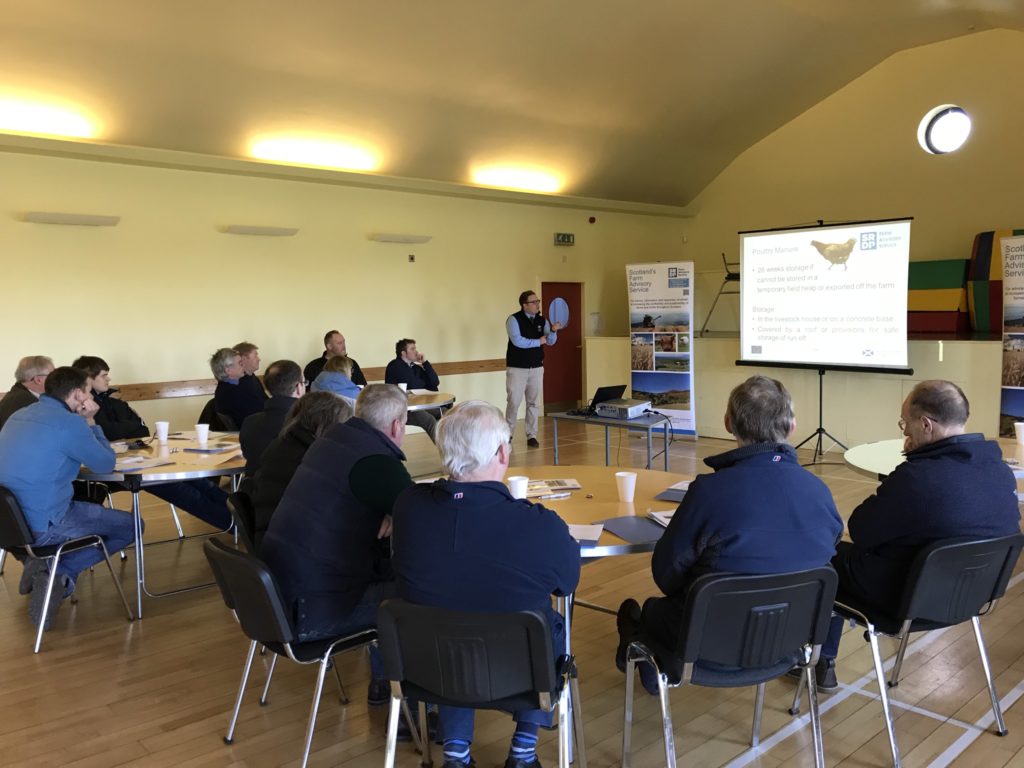NVZ & Nutrient Planning Workshop (Borders) – Event Summary
7 February 2018NVZ regulations
With the deadline for NVZ plans around the corner, farmers in the Borders were given a timely reminder of the NVZ planning and record keeping requirements at this workshop.
Agricultural consultants Andrew Baird and Jonathan Black explained the key requirements for an NVZ plan which can be summarised into four sections:
- RAMS map

- Calculation and record of storage capacity of livestock manures (if applicable)
- Calculation and record of 170kg N/ha loading limit for livestock manure (livestock numbers)
- An Nmax calculation for each crop type (field records)
Record keeping requirements were also covered, along with some of the most common inspection breaches and how to avoid them.
The workshop concluded with a discussion on Phosphate and how to optimise its use to maximise uptake by the crop and minimse losses to the environment. An update on the latest Greening rules was also provided. A copy of the presentation in full can be found here.
Take Home Messages
- Prepare your NVZ plan soon (before 1 March) if you haven’t already done so
- Amend your plan if things change (cropped areas, mucked fields etc)
- Take account of EFA features and uncropped areas in fields and update these annually
- Add value to NVZ planning by reviewing your fertiliser programmes (P, K & S) at the same time!
The downl![]() oads below were available at the event to take home for reference.
oads below were available at the event to take home for reference.
Careful nutrient budgeting can help to improve farm efficiency & by only applying the nutrients required by the crop, reductions can be made in the carbon footprint from the business. To read more about reducing your farm carbon footprint and to learn what other farmers have done visit the Farming For a Better Climate webpage.
- SMR 1 – Nitrate vulnerable zones
- The aim of SMR 1 rules is to reduce the pollution of waters caused or induced by nitrates from agricultural sources and to prevent such pollution occurring in the future.
- Topics: Rural Business
- Technical Note (TN674): Cross Compliance Inspection Process
- A Cross Compliance inspection checks that you are meeting the rules relating to Statutory Management Requirements and Good Agricultural and Environmental Conditions.
- Topics: Rural Business
- Workbook of all cross compliance checklists
- Cross compliance is a set of rules that must be adhered to in order to receive Common Agricultural Policy (CAP) support payments.
- Topics: Rural Business
- Technical Note (TN668): Managing Soil Phosphorus
- Efficient soil P management is challenging due to the varying ability of soils to mediate and regulate plant available forms of P. Farmers and land managers in Scotland are now able to access farm level information about their soils making it possible to provide more accurate P management advice.
- Topics: Crops and Soils
- Metric / Imperial conversion tables
- This sheet contains multiple metric to imperial conversion ratios that might be of use to you and your farm business.
- Topics: Climate Change, Soils, Crofts & Small Farms, Water Management, New Entrants, Livestock, Crops and Soils and Rural Business
Sign up to the FAS newsletter
Receive updates on news, events and publications from Scotland’s Farm Advisory Service


